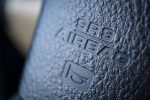
Takata Airbag Recall by BMW Raises Questions Over 30 Million Non-recalled Units
BMW is issuing a recall for a limited number of SUVs in the United States due to concerns about faulty airbag inflators manufactured by Takata Corp. of Japan. The recall, affecting 486 X3, X4, and X5 SUVs from the 2014 model year, stems from worries that the driver’s airbag inflators could rupture in the event of a crash, potentially releasing dangerous metal shrapnel and posing a risk of injury or death to occupants.
The recall has broader implications, raising questions about the safety of approximately 30 million Takata inflators currently under investigation by the National Highway Traffic Safety Administration (NHTSA). Notably, most of these units have not yet been subjected to recalls. Takata, a company that utilized volatile ammonium nitrate to trigger airbag inflation, faced significant issues as the chemical proved susceptible to deterioration over time, especially in conditions of high temperatures and humidity. This degradation could lead to an excessive explosion, causing the airbag canister to rupture and release shrapnel.
The use of Takata airbags has been associated with fatalities and injuries globally, with at least 26 deaths reported in the U.S. and 30 worldwide, including incidents in Malaysia and Australia. The extensive scale of potential malfunction prompted the largest series of auto recalls in U.S. history, involving around 67 million Takata inflators, though many remain unrepaired.
The current BMW recall draws attention to a unique aspect: the inflators in the affected vehicles contain a moisture-absorbing chemical called a desiccant, which was not part of previous recalls. This discovery has triggered concerns about the safety of similar Takata inflators with desiccants. Despite no identified safety risks at present, the NHTSA initiated an investigation in 2021 covering over 30 million inflators in more than 200 models from various car manufacturers.
BMW became aware of the issue in November when a complaint was filed with the NHTSA regarding a ruptured driver’s airbag in a 2014 X3. The preliminary investigation suggests a manufacturing problem during a specific period, from Feb. 22, 2014, to March 7, 2014. While BMW continues to investigate, it has been unable to inspect the X3 with the faulty airbag.
The NHTSA records include a complaint describing an incident in October where the inflator on a 2014 X3 exploded in Chicago, causing injuries to the driver. This has prompted concerns about the potential for explosive desiccated inflators, leading to an ongoing investigation covering various car and truck makers, including Honda, Stellantis, General Motors, Ford, Nissan, Tesla, Toyota, Jaguar Land Rover, and others.
The agency had decided in May 2020 not to recall inflators with desiccants, citing no immediate safety risk, but committed to monitoring them. As of now, the status of the investigation remains unclear. BMW plans to replace the faulty airbags at no cost to affected vehicle owners, with notifications set to begin on January 16.
This development comes after General Motors recalled nearly 900 vehicles in July with Takata inflators featuring desiccants, attributing the problem to a manufacturing defect at Takata. NHTSA, at the time, mentioned it did not possess data suggesting that other desiccated Takata inflators might rupture. The ongoing concerns and recalls underscore the continued challenges associated with Takata airbags and the importance of addressing potential safety risks promptly.
Source: Associated Press


